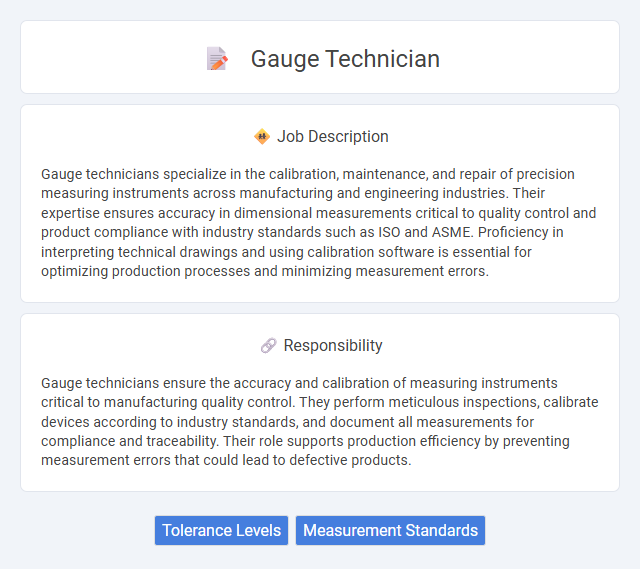
Gauge technicians specialize in the calibration, maintenance, and repair of precision measuring instruments across manufacturing and engineering industries. Their expertise ensures accuracy in dimensional measurements critical to quality control and product compliance with industry standards such as ISO and ASME. Proficiency in interpreting technical drawings and using calibration software is essential for optimizing production processes and minimizing measurement errors.
Individuals with strong attention to detail and good problem-solving skills are likely suitable for a gauge technician role. Those who can tolerate repetitive tasks and work accurately under pressure might find this job fitting. People with limited manual dexterity or poor concentration could face challenges in this position.
Qualification
Gauge technicians require proficiency in precision measurement and calibration techniques to ensure the accuracy of gauges and instruments used in manufacturing and engineering processes. A strong background in metrology, quality control standards, and hands-on experience with coordinate measuring machines (CMM) or digital calipers is essential. Certifications such as ASQ Certified Calibration Technician (CCT) or equivalent technical training significantly enhance job prospects in this specialized field.
Responsibility
Gauge technicians ensure the accuracy and calibration of measuring instruments critical to manufacturing quality control. They perform meticulous inspections, calibrate devices according to industry standards, and document all measurements for compliance and traceability. Their role supports production efficiency by preventing measurement errors that could lead to defective products.
Benefit
Gauge technicians likely benefit from specialized skill development that enhances their expertise in precision measurement tools and quality control processes. They probably enjoy career stability and opportunities for advancement within manufacturing or engineering industries due to the essential nature of their role. Benefits may also include competitive salaries and a work environment that supports technical growth and continuous learning.
Challenge
Gauge technicians likely encounter challenges related to maintaining precision and accuracy in measurements, which are critical for quality control in manufacturing. The complexity of calibrating and troubleshooting specialized equipment may demand continuous learning and adaptability. There is a probability that stress arises from tight deadlines and the need to meet stringent industry standards consistently.
Career Advancement
Gauge technicians specializing in precision measurement tools experience accelerated career advancement through mastering calibration techniques and quality control standards. Proficiency in interpreting technical blueprints and regulatory compliance opens pathways to supervisory roles or specialized inspection positions. Continuous training in advanced metrology technologies significantly enhances promotion potential within manufacturing and engineering sectors.
Key Terms
Tolerance Levels
Gauge technicians specialize in ensuring precision measurements by calibrating and maintaining gauges to meet strict industry tolerance levels. They use micrometers, calipers, and coordinate measuring machines (CMM) to verify that product dimensions adhere to specified tolerances, often within microns. Maintaining these tolerance levels is crucial for quality control in manufacturing processes, preventing defects, and ensuring components fit together correctly.
Measurement Standards
Gauge technicians specialize in maintaining and calibrating precision measuring instruments to ensure compliance with established Measurement Standards. They apply techniques based on national and international standards such as ISO/IEC 17025 to verify the accuracy and reliability of gauges used in manufacturing and quality control. Expertise in dimensional metrology and familiarity with traceability protocols are critical components of their role to maintain accurate measurement systems.
 kuljobs.com
kuljobs.com